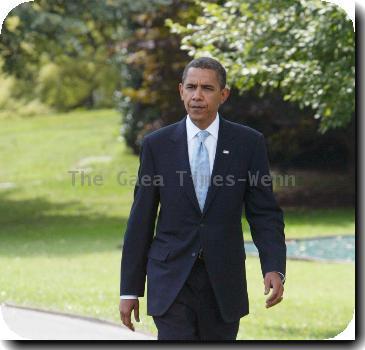Africans boycott meetings at UN climate talks to protest rich countries’ low emissions targets
By Arthur Max, APTuesday, November 3, 2009
Africans boycott meetings at UN climate talks
BARCELONA, Spain — African countries ended a boycott of meetings at U.N. climate negotiations on Tuesday, after winning promises for more in-depth talks on how much rich nations need to cut greenhouse gas emissions.
Due to the Africans’ demands, most of the rest of this week’s talks in Barcelona will be devoted to discussing carbon-cutting pledges rather than other issues including carbon offsets and action by developing countries, said John Ash, chairman of the negotiations on emissions.
The Africans, supported by about 70 other developing countries, said industrial nations were making weak commitments to stave off dramatic temperature rises while Africa was being devastated by droughts and floods blamed on global warming.
Scientists say industrial countries should reduce emissions by 25 to 40 percent from 1990 levels by 2020, but targets announced so far amount to far less.
The Africans say industrial nations should reduce emissions by at least 40 percent by 2020.
The walkout by some 50 African countries from committee work at the U.N. talks in Barcelona forced only some technical meetings to be canceled, but sent a clear signal that the developing countries would be tough negotiators at next month’s final U.N. climate conference in Copenhagen, Denmark.
Negotiators hope to adopt a treaty in Copenhagen on regulating carbon emissions.
“It’s really good that the Africans have finally been able to stand up together,” said Fiona Musana of Johannesburg-based Greenpeace Africa. “That sends a strong signal.”
It was the first time the Africans have taken such concerted action at the U.N. climate talks, but they have been coordinating their position over the past year to ensure unity in the final lead-up to the Copenhagen conference.
“I don’t think we can get to a result in the way we’re going now,” Algerian negotiator Kamel Djemouai said earlier on the Africa grouping’s boycott. “We cannot prejudge what will happen next until we see the reactions of others.”
A landmark 2007 U.N. report based on the work of about 2,000 scientists predicted Africa would suffer the most from drought, agricultural damage, rising sea levels threatening coastal areas and the spread of tropical pests and diseases.
A new study published Tuesday says the glaciers on Africa’s highest mountain, Kilimanjaro, have lost 85 percent of the ice they had in 1912, with more than a quarter present in 2000 gone by 2007.
The study, in the Proceedings of the National Academy of Sciences, cited Earth’s rising temperatures as at least a partial cause. It said similar changes have occurred at Mount Kenya and the Rwenzori Mountains in Africa, as well as at glaciers in South America and the Himalayas.
The success of the African action Tuesday put extra pressure on the United States to declare its intentions at the U.N. talks before the Dec. 7-18 Copenhagen meeting.
The Copenhagen deal would succeed the 1997 Kyoto Protocol, which called on 37 industrial countries to reduce heat-raising gas emissions by an average 5 percent below 1990 levels by 2012. It made no demands on developing countries like India and China. The United States was the only major greenhouse gas emitter to reject the Kyoto accord.
The U.S. says it is waiting for Congress to finish work on climate and energy legislation. Those bills, unlikely to be completed before the Copenhagen summit, suggest the U.S. would cut emissions only about 4 percent below 1990 levels over the next decade.
President Barack Obama on Tuesday was meeting visiting EU leaders hoping to advance a climate policy. European Commission President Jose Manuel Barroso said forging a climate deal would be “a defining moment” for his generation of world leaders, and that he was worried by the lack of progress toward a final agreement in Copenhagen. But he dismissed the suggestion that leaders should aim for a watered-down treaty.
“If you start to speak of Plan B in Copenhagen, you will probably end up with Plan F,” he said in Washington.
German Chancellor Angela Merkel, also in Washington, told a joint session of Congress there was “no time to lose” on reaching a deal on global warming, while Republican senators boycotted the start of committee debate on a bill to curb greenhouse gases.
In London, U.N. Secretary-General Ban Ki-moon admitted the climate change treaty may not be resolved this year, as nations may be unable to commit to firm emissions limits at Copenhagen.
“We may not be able to agree all the words,” Ban said, adding that the Copenhagen pact could more likely be an agreement on principles — rather than specific targets for cuts. “We need at this time the political will — if there is a political will, there is a way we can come to a binding agreement in Copenhagen.”
Associated Press Writer Desmond Butler and AP Science Writer Randolph E. Schmid contributed to this report from Washington, DC.
Tags: Africa, Barack Obama, Barcelona, Boycotts, Copenhagen, Denmark, Diseases, Environmental Laws And Regulations, Environmental Policy, Europe, Events, Foreign Aid, Global Environmental Issues, Government Regulations, International Agreements, Land, North America, Spain, United Nations Climate Change Conference 2009, United States, Western Europe

